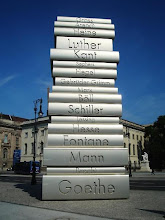
"I taught him," he quavered, "to trust in love. I said: 'When love comes that is reality.' I said: 'Passion does not blind. No. Passion is sanity, and the woman you love, she is the only person you will ever really understand." -Mr. Emerson
In "A Room With a View" E. M. Forester pleas for liberation, not only for his characters, but for himself. Liberation from the "oppressing" expectations of society. His characters do receive that liberation, but did they merely trade one type of slavery for another?
The Plot
The Plot
The first half of "A Room With a View" takes place in Florence, Italy at the start of the 20th century. Lucy Honeychurch, like most young people of that time, is on a tour of Italy to see all the important sights and to "experience" another culture. It is here that she meets Mr. Emerson and his son George. Both of these men have very unconventional (almost socialistic) views on life. While they are by no means rude and uncouth, they have a general disregard for the expectations of society. They frankly express their feelings, place passion above propriety, and have unorthodox opinions concerning religion. Most of the English people who meet them are either shocked and avoid them, or patronize them as if they were children. Lucy, however, has an uncanny liking for them, especially George. When Lucy faints in a market square after witnessing a murder, she wakes up in George's arms and her life changes forever. She constantly tries to avoid the thoughts and feelings that are developing in her. In the end, she tries to escape them by fleeing to Rome and then back home to England.
The second half of the book takes place back in England. Lucy is now engaged to Cecile Vyse, a young man who despises most of the people around Lucy and sees her as a work of art for him to admire, interpret and think for. Then, to Lucy's horror, the Emersons move into a house just down the road from her family, bringing with them all of the feelings for George that she thought she had left behind in Italy. Now she must choose between the man society says she should marry, and the man her heart desires.
Florence, Italy
My Review (Caution: Spoilers)
Forester uses two distinctly different cultures to represent the two forces that his characters use to make their decisions. England represents reason and propriety, where every decision made is based on what is most reasonable and socially acceptable. Italy represents passion and desire, where decisions are made based on emotion and feeling. Lucy is forced to choose between the conventional Cecil and the passionate George, and we as readers are forced to choose as well. No middle ground is offered, so which choice is the right one?
Certainly, we cannot let our own reason be the standard by which we make our decisions. Proverbs 14:12 "There is a way that seems right to a man, but its end is the way of death." Neither can we set our standards by the expectations of our society. Romans 12:2 "And do not be conformed to this world, but be transformed by the renewing of your mind, that you may prove what is that good and acceptable and perfect will of God."
Forester is correct in wanting liberation from the dependence on those around us to make our decisions, but his desire of our decisions being made based solely on our emotions and passions is incorrect. Jeremiah 17:9 "The heart is deceitful above all things and beyond cure. Who can understand it?" Lucy gains the desired liberation from society, but she then becomes enslaved to her emotions.
The only way to gain true liberation is to submit to Christ. He is the middle ground between reason and passion, between England and Italy. Psalm 116:16 "O LORD, truly I am your servant; I am your servant, the son of your maidservant; you have freed me from my chains."
"A Room With a View" begins with noble intentions, but ultimately it fails in it's quest to free its characters, its author and its reader.

















No comments:
Post a Comment